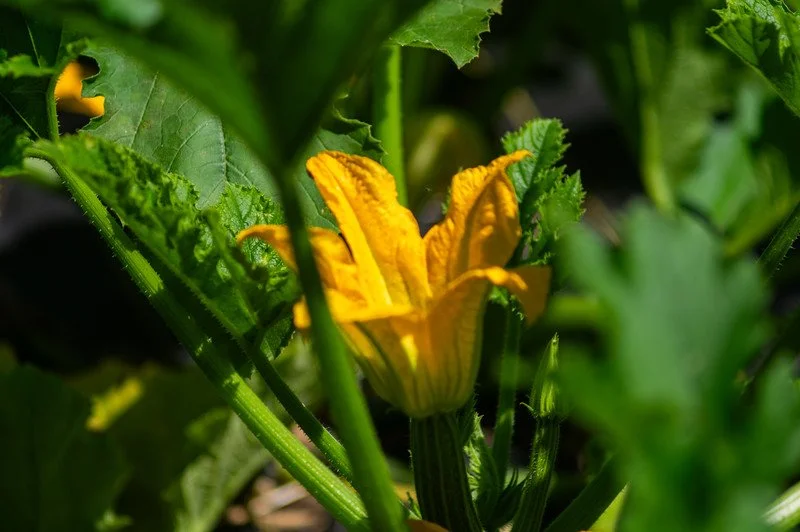5th Week of the Summer CSA Season: Week of July 9th
Galen harvesting sugar snap peas, photo by Adam Ford
This Week’s Availability
This week we will have fresh beet bunches, fresh carrot bunches, scallions, slicing cucumbers, garlic scapes, salad turnips, bok choi, radishes, green curly kale bunches, lacinato kale bunches, rainbow chard, spinach, arugula, baby lettuce, basil, rhubarb, sugarsnap peas, summer squash, green zucchini, and costata romanesco zucchini.
brussels sprouts looking good in their mulched strips among the clover cover crop, photo by Adam Ford
Farm News
When I started getting drawn in by farming as a form of climate action in my early 20s, I read a lot of Wendell Berry, and this week I saw a quote from his collection of essays, The Long-Legged House, making its rounds on the internet, that spoke to me then and continues to guide my work as a farmer:
“We have lived by the assumption that what was good for us would be good for the world… We have been wrong. We must change our lives, so that it will be possible to live by the contrary assumption that what is good for the world will be good for us. And that requires that we make the effort to know the world and to learn what is good for it. We must learn to cooperate in its processes, and to yield to its limits.” (Italicization is my own emphasis.)
The concept of yielding to the limits of the earth seems so profoundly outside of the discussions of climate solutions. I’m grateful to have experienced the gift of a attending a small farm camp as a kid where there was a strong emphasis on being mindful of our consumption as the first step of living within the limits of the earth’s resources. While we have been dedicated installing solar panels and electrifying everything that we can, the general rate of consumption of the average American is too much to electrify our way out of the moment we are in. Rereading Wendell Berry reminds me that collectively, we need to learn what is good for the world and that leaning into that goodness for the world would inherently be good for us. Farming puts us up against limits daily: the time we have to tend to all the tasks, the resources we have to grow food and solve problems, the strain we put on our bodies to work physical labor jobs, etc. Everything is finite, so within that context, it’s worth reimagine what we actually need.
Have a great week,
-ESF Team: Ryan, Kara, K2, Miguel, Cindy, Galen, Katie, Taylor, Vanessa, Bryan, and Evan (and Sky and Soraya)
K2 crushing the sugar snap pea harvest, photo by Adam Ford
cilantro and scallions with some beneficial alyssum planted in the middle, photo by Adam Ford
here’s another clump of beneficial flowers we plant among the vegetables, photo by Adam Ford
that’s the electric UTV pulling a cart full of bins, that will all get filled up with harvest, all to return to the wash station without using fossil fuels to move vegetables around, so cool! photo by Adam Ford
Ryan and a bit of mulch left on the tractor pallet, photo by Adam Ford
Echo checking to see if there are enough flowers to pick a bouquet yet (verdict= almost!), photo by Adam Ford
Taylor washing greens, photo by Adam Ford
scarlet runner beans, photo by Adam Ford
zucchini flower photo by Adam Ford
buckwheat cover crop, photo by Adam Ford
look what little cutie I saw grazing with its mama!
Ryan and Bryan, photo by Adam Ford
strawflower is one of my favorite flowers with it’s ability to provide longevity, photo by Adam Ford
Vane taking a break from sugar snap pea harvesting. We feel very lucky that my brother and sister-in-law come to live and work with us for a chunk of the year… a gift for our kids to have an aunt and uncle on the farm, photo by Adam Ford
tissue paper delicate poppies are always buzzing with pollinators, photo by Adam Ford
dill heads provide excellent habitat for pollinators in the field, photo by Adam Ford
baby romaine, photo by Adam Ford
we have a few goosberry plants, photo by Adam Ford
and also some blueberry plants, photo by Adam Ford
starting to ripen! photo by Adam Ford
watering in a strawberry planting, photo by Adam Ford
more strawflower, photo by Adam Ford
cosmos, photo by Adam Ford

























